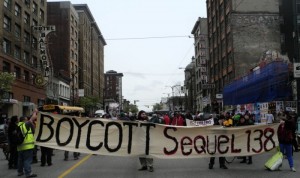
Image taken from: http://themainlander.com/wp-content/uploads/2012/04/seq5.jpeg
“Activism” is not a word shared by everyone in describing the activities and programs at the Downtown Eastside Neighbourhood House. I have always felt that the title “activist” was a badge earned, something you couldn’t just call yourself but something that had to be demonstrated in your actions and beliefs, sort of like “artist” or “superhero.” However, the word evokes a specific kind of social involvement for a lot of people at the Neighbourhood House, one that they try to distance themselves from by substituting in other words to describe their activities and involvement. In particular, “education,” both as a replacement term for the kinds of activities I have described as “activism” as well as a process in and of itself, has played an important role in setting the Neighbourhood House apart from other service providers and establishing a unique community in the heart of Vancouver.
Like the Community Transformational Organizing Strategy (CTOS) implemented by Asian Immigrant Women Advocates (AIWA), the DTES Neighbourhood House’s emphasizes education, skill building, and empowerment, although they use no formal terms or model to describe what they do. I first came across peoples’ idea of the Neighbourhood House as a place of education in an interview I conducted with a staff member. She explained that she was hesitant to include the word “activist” in her job title because she did not feel that her role, or the role of the Neighbourhood House, was to advocate on anyone’s behalf. When I asked what word she would use in place, she mentioned “educator” or “education” in describing the activities at the Neighbourhood House. In another interview I did with another staff member, he explained that the biggest role of the food programs at the Neighbourhood House was to teach people the basic skills they needed to obtain and prepare nutritious foods. Similar to AIWA and the CTOS model, the focus and goals of these programs ends up being placed on self-activity and empowerment rather than any successes in policy change.
Education acts as a process that allows people to assert agency on a more intimate level and the decision to participate in wider political action becomes an informed decision of the individual. Every activity is a discussion, a workshop, a movie screening, or a talk and it is rare to see activities where people organize protests or even pass around petitions. After describing her role as an “educator” at the Neighbourhood House, one of the staff members I interviewed went on to explain that her job was to “inspire and train activists.” This is what separates the Neighbourhood House from other groups and service providers in the area: they do not advocate on behalf of anyone nor do they passively supply people with services without leaving room for discussion and development. A couple of people have explained to me that this is because they want to be as inclusive and active as possible without putting any one person off because of their hesitancy to be involved in more opinionated and aggressive action. Education, and education surrounding the preparation and consumption of food in particular, appeals to almost everybody (“we all have to eat” – echoed by two of my interviewees), is inclusive (we all have to eat and we are also all capable of learning new things), and most importantly, it empowers people to assert agency in their own daily lives.

This post was a pleasure to read! I love how engaging the piece is from the get-go, and you relay a lot of information in a very limited space. I feel that your break down of activism vs. education was a very interesting and informed analysis, and I feel I learned a bit about how to rethink these two terms. Thank you for sharing!